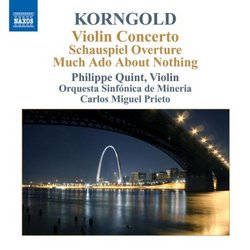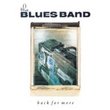| All Artists: Philippe Quint Title: Korngold: Violin Concerto / Schauspiel Overture / Much Ado About Nothing Members Wishing: 0 Total Copies: 0 Label: Naxos Original Release Date: 1/1/2009 Re-Release Date: 6/30/2009 Genre: Classical Styles: Forms & Genres, Concertos, Theatrical, Incidental & Program Music, Symphonies Number of Discs: 1 SwapaCD Credits: 1 UPC: 747313079179 |
Search - Philippe Quint :: Korngold: Violin Concerto / Schauspiel Overture / Much Ado About Nothing
 | Philippe Quint Korngold: Violin Concerto / Schauspiel Overture / Much Ado About Nothing Genre: Classical Much admired today as a pioneer of film music, Erich Korngold was a precociously — talented composer of concert and chamber music, opera and stage works, as his — Schauspiel Overture, written when he was only fourteen, shows... more » |
Larger Image |
CD DetailsSynopsis
Product Description Much admired today as a pioneer of film music, Erich Korngold was a precociously talented composer of concert and chamber music, opera and stage works, as his Schauspiel Overture, written when he was only fourteen, shows. The phenomenal success of his Violin Concerto, an ultra-romantic masterpiece drawing themes from his scores for the films Another Dawn, Anthony Adverse and The Prince and the Pauper, has overshadowed much of his other music, though his Much Ado About Nothing Suite has remained popular for its expressivity, humour and robust good spirits. This recording showcases another brilliant performance by violinist Philippe Quint. Similar CDs
|
CD ReviewsNaxos does it again... L. Ackerman | Ashburn, VA (USA) | 07/10/2009 (5 out of 5 stars) "I grew up during the time when this concerto was considered "not cool" or "too schmalzy". There were hardly any recordings made of it. But I could not care less. It is a marvellous concerto, and it makes your heart melt as most of Korngold music does: melodically and harmonically. This recording is a blockbuster! Quint is spectacular (what pure tone!), the Mexican orchestra is first class (as is its conductor) and the recording is to die for: amazing sound! And all this at NAXOS price. Wow!" Philippe Quint, Carlos Prieto, Orch Sinf de Mineria: Korngol Dan Fee | Berkeley, CA USA | 01/04/2010 (5 out of 5 stars) "I'm coming to this disc, fresh from being bowled completely over by Renaud Capucon with Yannick Nezet-Seguin conducting the Rotterdam Philharmonic. I still hold that release in five star esteem, and this one, too, as it turns out. Once upon a past time, Naxos was interesting as an innovative label, but wildly variable in quality. You could find reams of unheard and less often heard music, but the performers might be anything from inspired to dutiful. So Naxos was a pick and choose affair for canny customers in the know. Now, however, the label has released so many clearly outstanding discs that its catalog must be tipping towards high excellence, period. Add this release to the winners; it easily stands out as a Naxos high mark. News arrives just now that this disc is nominated for a 2009 Grammy. Quint plays a 1723 Strad (Kiesewetter), on loan from Clement and Karen Arrison through the Stradivari Society. The loan of this stunning instrument says a lot in itself. Quint was born in Russia but trained in the west, including his being in passing a Juilliard School student of the famous Dorothy Delay. He is brimming with musicianship and star quality. Oodles. In the first opening notes of the Korngold concerto, Quint and the band demonstrate alert engagement with the color and gestural sweep of this music. The reading is more expansive than not, risking rubato and swagger more than the utterly deft balancing act that Capucon and Nezet-Seguin pull off for EMI Virgin disc. All to the good. Nobody actually falls off the musical fences into the stock silent film score character mugging that has dogged this music as a persistent shadow reputation. The busy, modernist chromatics are transmitted as sparkling lights, not extra handful of glitter hastily pasted on. Tempos are set, then paced beautifully. The Mexico City band rises to the Korngold occasion, confident, persuasive. The players are not just accompanying Quint, but rather are musically integrated with him into the eloquent concerto whole. The slow middle movement is precisely the high moment it was meant to be, then the finale last movement takes off with robust theatrics, again ever so finely judged. The band gets to show off in the Schauspiel Overture. It was written when the composer was only fourteen years old, so of course it fails to demonstrate the savvy maturity of the later violin concerto. Yet, yet, yet. Carlos Miguel Prieto and the band serve it all up, handsomely. Their art is partly the art of not trying to take this youthful work more seriously than it can be heard to be; if Hollywood film composers later exploited similar colors and gestures, we must strictly recall that they are indebted to Korngold (including the fourteen year old who wrote this overture), not the other way round. After thirteen minutes or so of German prodigy promise, a listener is happy to return to the Suite the composer worked out of his music, incidental to a performance of Shakespeare's Much Ado About Nothing as given at Vienna's Schonbrunn Castle in 1920. We are yet again, off and running full tilt into the more mature composer's magical realms. A five minute overture with some dazzling woodwind writing is followed by four additional character pieces. Listeners new to this suite may hear it as a rehearsal of familiar film score attitudes; but real history again reverses the order of our musical influences. This Much Ado music was 1920, years before the Korngold scores for Captain Blood, Robin Hood, King's Row. Before - Korngold came to America or Hollywood. Bravo, all concerned, Bravo Naxos. Five stars." Philippe Quint just fabulous black gorilla | Cocoa, FL | 03/13/2010 (5 out of 5 stars) "I bought this CD because the violinist (Quint) was in Florida at a symphony series we caught and I couldn't take my eyes off him. He was just great. And, you knew he would be when he first brought the bow to the strings and produced that most wonderfully exquisite sound. I've listened to this CD quite a few times and never get tired of hearing it."
|



